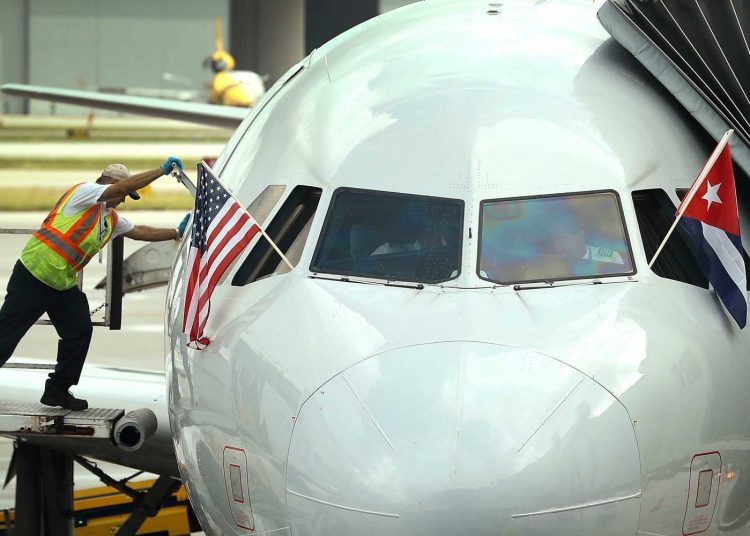The U.S. Department of Transportation announced that all charter flights from the United States to the interior of Cuba will be suspended “until further notice.” The Havana route is barely covered, as happened last year with commercial flights by U.S. airlines. The new measure affects nine airports on the island. It is not clear whether the bilateral civil aviation agreement, signed in 2016, will remain in force or will be canceled.
The new restriction will begin on March 10. A cap on charter flights will also be established, to be defined in the coming weeks.
As indicated in a press release by Secretary of State Mike Pompeo citing the existence of a letter to Secretary of Transportation Elaine L. Chao, the objective is to “strengthen the impact of the administration’s policy of economically pressuring the Cuban regime” in areas such as human rights and fundamental freedoms due to Cuban support to the Venezuelan government.
Cuba’s reaction was almost immediate. “I strongly reject new ban by #US government on charter flights to #Cuba except# Havana and restriction on their number. It is a serious violation of human rights, Americans’ freedom to travel and hinders family reunification. #CubaVSBloqueo,” Cuban Foreign Minister Bruno Rodriguez wrote on his Twitter account.
The announcement of the new restrictions was made by Pompeo through a press release on Friday morning. He argues that it “will further restrict the Cuban regime’s ability to obtain revenue, which it uses to finance its ongoing repression of the Cuban people and its unconscionable support for dictator Nicolas Maduro in Venezuela. In suspending public charter flights to these nine Cuban airports, the United States further impedes the Cuban regime from gaining access to hard currency from U.S. travelers.” Last October, the Trump administration also suspended U.S. airlines’ flights to the interior of the country, a restriction that went into effect on December 10.
The Secretary of Transportation still hasn’t announced the number of charter flights that will be allowed in the future. But several sources in the travel agencies promoting those flights were worried hours after the announcement due to the impact that the measure could have, among other things, on the industry’s workforce. “It’s a problem, better said, it will be a problem if the amount of flights they are going to allow us is smaller, for example, about 10 a week [from all over the country]. I don’t see how the workforce will be maintained,” said Mireya González, a travel agent with an office in Little Havana. At this time, charter companies fly 18 times a day to Cuba from several airports in the country, mainly on the East Coast.
Travel agencies were caught by surprise, especially as regards the possible imposition of a flight quota. “We were expecting it. When commercial flights to Havana were restricted, many of us wondered why the same did not apply to us. Well, you see, it was a matter of time,” the source added.
Meanwhile, it is also unclear whether this clampdown in an election year will have some impact on the re-election of Donald Trump. “This is in line with what [Cuban-American Republican Senator Marco] Rubio thinks the approach [towards Cuba] should be, against that socialist line and travel to Cuba. [Republicans and the White House] must have some clue that tells them they should risk this path,” analyst and professor at Florida International University Eduardo Gamarra told OnCuba.
All this considering that “the youngest are the most affected, but the young Cubans don’t vote, the second and third generation behave like normal apathetic voters. And those who arrived from the year 2000 onwards are not registering in the same proportion. The calculation is still that the old are going to vote. Moreover, all the elders are in favor of this and in favor of closing everything,” he said, referring to a possible electoral impact.
A reflection of this is Republican Congressman Mario Díaz-Balart’s press release. “Once again, the Trump Administration has announced an important measure to cut off U.S. dollars to the Cuban dictatorship by ending charter flights through all Cuban cities except Havana. The administration knows that the regime profits handsomely from travel and tourism dollars, using them to oppress the Cuban people such as imprisoned activist Jose Daniel Ferrer, and to assist the Maduro regime in oppressing the Venezuelan people as well. I commend the administration’s concerted, multiagency efforts to cut off revenue to the Cuban people’s oppressors,” he said.










